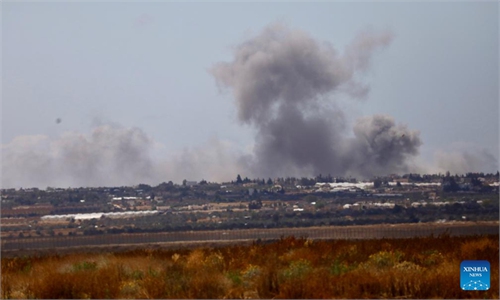Contradictory remarks show voter responses determine US’ attitude toward Gaza war: experts

Displaced Palestinians are seen in Jabalia, northern Gaza Strip, on May 30, 2024. Local sources reported that Israeli troops have withdrawn from the western and southern regions of Jabalia in northern Gaza, while some soldiers remain in the northern and eastern areas of the city. In a statement, the emergency committee in the northern Gaza Strip urged residents to "be patient and not return to the northern areas of the Gaza Strip at this time." (Photo: Xinhua)
Amid multiple parties attempting to restart talks on a Gaza truce, US President Joe Biden, in an interview with Time magazine published on Tuesday, suggested that Israeli Prime Minister Benjamin Netanyahu is prolonging the war to stay in power, but sought to walk back his suggestion later on the day when asked by reporters in Washington.
The contradictory remarks by the US leader must have come out of domestic political considerations, Chinese analysts revealed. The focus for the Biden administration right now is not how the war is going to go, but how domestic voters are going to respond, they said.
Asked whether Netanyahu was prolonging the war in Gaza in an effort to hold on to office, Biden said that he believed "there is every reason for people to draw that conclusion," in an interview with Time magazine published Tuesday that was conducted May 28, three days before Biden gave a speech revealing the details of what he called an "Israeli plan" to bring about an exchange of hostages and a permanent ceasefire.
However, on Tuesday in Washington, Biden sought to walk back his suggestion that Netanyahu may be prolonging the war in Gaza due to his own political considerations, saying he did not think the Israeli leader was doing so, the New York Times reported.
Biden does not want to lose Arab American voters who usually call for a permanent ceasefire and a de-escalation of violence in Gaza, but at the same time, he is unwilling to displease voters who support Netanyahu, Zhu Weilie, director of the Middle East Studies Institute of the Shanghai International Studies University, told the Global Times on Wednesday.
In this context, analysts appear to be pessimistic toward a permanent ceasefire in Gaza in the near future, although multiple parties in the international community are working toward it.
An Egyptian security delegation is set to meet with Qatari and US counterparts in Doha on Wednesday in attempt to revive Gaza truce negotiations, Egyptian State TV and the state-affiliated Al-Qahera News TV channel reported on Tuesday, citing sources.
Qatar said on Tuesday it had delivered an Israeli ceasefire proposal to Hamas that reflects a three-phase proposal presented on Friday by Biden, and that the paper was now much closer to the positions of both sides, according to a press report by the Alarabiya News on Wednesday.
However, a spokesman for Hamas reiterated on Tuesday it could not agree to any deal unless Israel makes a "clear" commitment to a permanent truce and complete withdrawal from Gaza.
For his part, Netanyahu repeated that there can be no permanent peace unless Hamas is eradicated, as he struggles with profound political divisions at home over the US-backed truce proposal, Alarabiya News reported.
According to Alarabiya News, Israel's war in Gaza has killed more than 36,000 Palestinians.


